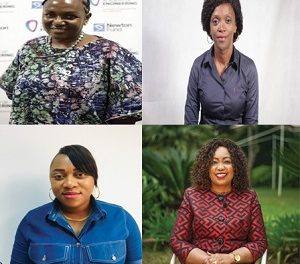
African Energy Week maintains a strong position on the role of women in Africa’s energy transformation

Africa’s energy sector transformation and success hinges on women taking a leading role in the development of the sector, and African Energy Week will ensure women take up their rightful seat at the global energy table.
Africa’s energy success will be determined by the role women play in the continent’s development, not just as participants but as notable leaders and contributors. For decades, women have played a disengaged role, with inequality, barriers to entry, and lack of inclusion across levels of the professional ladder hindering effective progress. Now, the world has realized the role that women play in Africa’s development, and thus, we have seen an increase in the number of women leading the continent’s transformation.
Promoting the role that women play in Africa’s energy sector is not a new narrative, and rather than continue with a promotional agenda, African Energy Week (AEW) 2021 in Cape Town is going one step further by directly addressing the barriers to entry, offering clear solutions to be adopted by governments, companies, and policymakers, and ensuring stakeholders remain accountable to the numerous declarations made. With the energy sector comprising one of the most unequal industries globally, AEW 2021 will address this head-on, providing critical strategies to increase women’s participation.
At the heart of the energy sector’s lack of diversity and gender gap lies traditional and cultural perceptions regarding roles. Barriers to entry start from a young age, with women discouraged from pursuing Science, Technology, Engineering, and Mathematics (STEM) fields. The industry needs to address challenges from across the entire professional value chain. Yet, once women manage to complete education within STEM, new barriers emerge regarding the workforce. For years, women have taken on more ‘feminine’ positions in the workforce, such as administrative, while their male counterparts have more easily attained proactive and executive roles.
“It is a two-pronged approach: firstly, unless you tackle the foundation, by having more women able to study engineering and is supported in the study of STEM subjects, you won’t see inclusivity. Secondly, we need favorable workplace practices. There continue to be societal norms, biases, and prejudices in the oil and gas industry and it is a shame we are still talking about inequality in 2021,” stated Ayotola Jagun, Chief Compliance Officer and Company Secretary, Oando PLC, Nigeria.
Meanwhile, the energy transition has created the opportunity for enhanced inclusivity and might just be the driving factor of increasing women’s participation and leadership. As the world actively pursues the transition to cleaner fuel sources, the global energy sector requires increasingly innovative solutions and new business models. With the move to a renewable future on the cards, as well as the immediate need to introduce decarbonization technologies to current projects, the International Energy Agency notes that the industry will require greater participation from a diverse talent pool. Therefore, opportunities for women are becoming increasingly more available.
“What we want is the concept of inclusion. At TotalEnergies, we believe in the value of everyone and of different perspectives and solutions. Diversity and inclusion are about women and men working together, with the same resolve, to achieve the same target,” stated Sandra Almeida, Legal Manager, TotalEnergies EP, Angola.
AEW 2021 has not only prioritized a diverse speaker panel at its event but has ensured that women remain at the center of every discussion on Africa’s energy future. Africa needs women to advance, and it is time that the industry recognizes the value and importance of having women lead Africa’s energy and economic transformation.















































